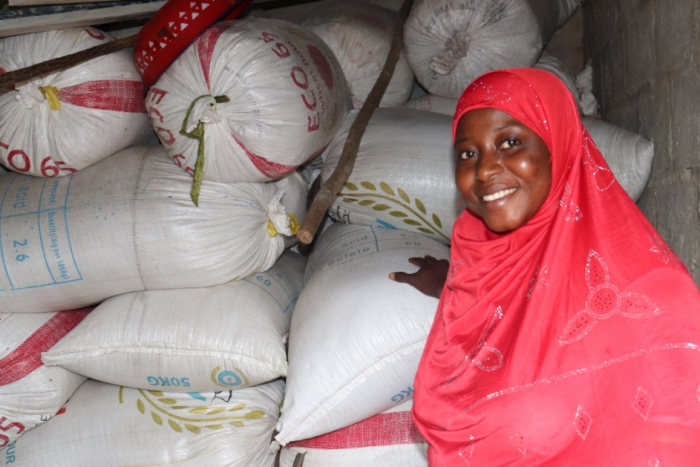
Some individual farmers have reportedly harvested up to 450 bags of rice, an achievement that strengthens not only national food self-sufficiency but also provides a significant financial boost, enabling farmers to invest in new business ventures.
The 80 million U.S. dollar Resilience of Organisations for Transformative Smallholder Agriculture (ROOTS), is designed to empower smallholder farmers through improved access to inputs, training, and infrastructure. Its impact is already being felt in communities where rice farming is a primary source of income.
Saikou Kanteh, a rice farmer from CRR, described how the intervention has transformed his life. “Before ROOTS, farming was unpredictable. Now, with better support and tools, I am able to produce more rice. I use the income to pay my children’s school fees, run a small business, and even fence our compound,” he said with pride.
Kanteh’s story is echoed by many others in the area who have seen their yields increase and their savings grow. Farmers report that the project has not only improved their farming techniques but also supported them with seeds and fertilisers among others. The initiative is helping farmers move beyond subsistence farming to more sustainable and profitable models.
As the farming season progresses, optimism continues to grow in CRR, and with the ROOTS project gaining momentum, farmers are hopeful that the gains made so far will be sustained and expanded to reach even more communities.
The Roots Project continues to transform rice farming in Jahally, Central River Region, by providing vital support to local farmers. Assistance includes the provision of seeds, fertilisers, herbicides and ploughing services, among other interventions aimed at boosting productivity.
In a major infrastructural upgrade, the project has repaired 104 water control gates—many of which had remained untouched since 1983. These gates are essential for regulating water flow to the rice fields, a critical factor in successful cultivation. Additionally, 11 culverts within the rice fields have been rehabilitated to improve access and drainage.
Officials say the initiative is designed to ensure farmers can reach their fields more easily and manage water resources more effectively, ultimately enhancing yields and improving livelihoods.
Kanteh, a 51-year-old farmer from Jahally, has shared how the ROOTS project has transformed his rice farming experience, significantly boosting both productivity and income.
“I only cultivate one plot, which is 0.5 hectares,” he explained. “However, thanks to the quality seeds and other support provided by the project, I was able to harvest 60 bags of rice from that single plot.”
Before the intervention, Kanteh said feeding his family was a challenge, and the rice fields were poor. “Before, I had to buy rice from the shops. But now, I don’t need to unless someone gives me a bag, I have enough from my own harvest,” he said.
Beyond feeding his household, Kanteh has been able to sell part of his harvest to fund other ventures. “I have used the proceeds to start small businesses, pay my children’s school fees, and others. I have also invested in small ruminants,” he added.
Musa Seediya Ceesay, a 48-year-old rice farmer from Jahally, has praised the ROOTS project for its transformative impact on farming in the region. He described the project’s support as a “significant contribution” that has dramatically increased productivity and eased the burden on farmers.
“This year, my 6 rice plots produced 450 bags,” he revealed. “Before the project’s intervention, accessing our fields was nearly impossible due to flooding. Now, I plan to sell 150 bags and keep the remaining 300 to feed my family.”
With more than a dozen children in school, Musa said the income from rice sales has enabled him to pay school fees and cover other household expenses. “The project has made our work much easier. We no longer rely on heavy manual labour as everything is mechanised. They provide us with herbicides, fertilisers, and even plough our fields,” he explained.
Beyond material support, Musa highlighted the training farmers receive in modern agricultural techniques. “They have not just helped us with inputs they are teaching us smarter ways to farm,” he said.
Hawa Sumareh, another beneficiary of the Roots Project intervention, shared her success story, highlighting the positive impact the initiative has had on local livelihoods.
“Thanks to the project, we no longer worry about the price of rice in the shops. We eat what we produce from our own fields,” she said proudly.
Project officials confirmed that rice farmers in the area have been supported with high-quality varieties, including Sahel 134, Faro 44, and ISRIZ 7. They attributed the recent bumper harvests to the use of these improved seeds, along with other forms of technical and material support provided under the initiative.




